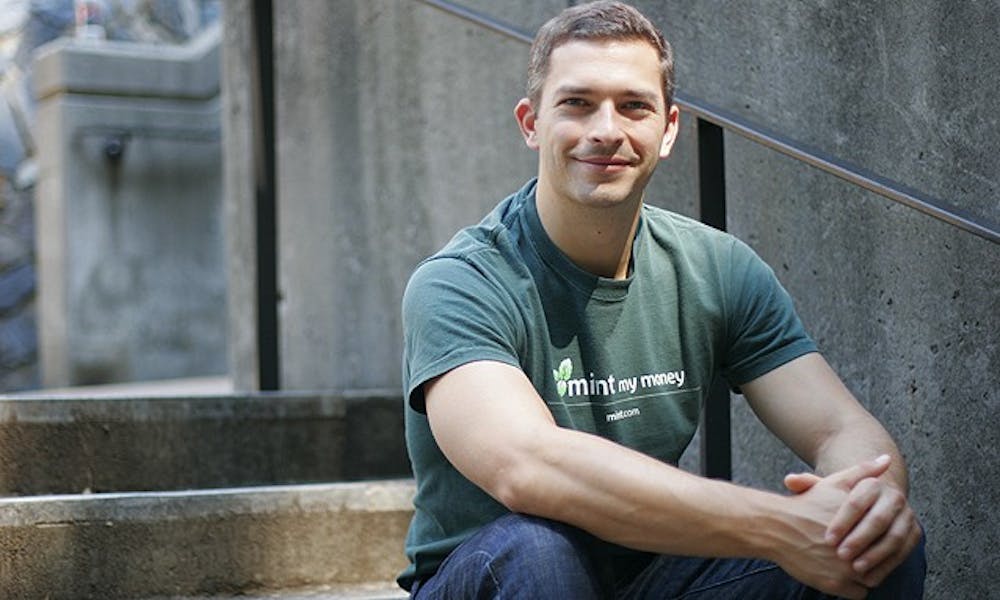Renowned entrepreneur Aaron Patzer, Pratt ’02, is the founder of Mint.com, a personal finance website currently used by more than 6 million people. The website was sold to Intuit for $170 million in 2009. Patzer, who also manages the personal finance software Quicken, visited Duke for the Career Fair last week.The Chronicle’s Virginia Chen spoke to Patzer Wednesday about the inspiration behind Mint.com and tips he has for Duke students hoping to succeed, whether in entrepreneurial ventures or in their personal finances.
The Chronicle: How did you get the idea for Mint.com?
Aaron Patzer: I had started a couple of businesses back in high school building websites. I was co-mingling my business and personal finances, and I needed a tool to help me manage my money. So I was using Quicken and Microsoft Money for a long time, through the end of high school and through college. And then I got really busy with a start-up, and I didn’t manage my finances at all, and I went in and the system Quicken downloaded 400 to 500 transactions, and they were all uncategorized and so I didn’t really get any insight. I just wanted to know how much I was spending on restaurants and electronics and books, and what was the breakdown of my spending. And it couldn’t do it. And Microsoft Money couldn’t do it at the time. And so I said, there has got to be a better way. So I came up with an algorithm, because I have a computer science and electrical and computer engineering background here at Duke... so I correlated all these bank transactions with the Yellow Pages so it knows, like, George’s is a restaurant. And from that, I realized I could categorize transactions accurately, and that meant the user knew where they were spending their money, which was great because you could set budgets. It would accumulate your transactions, categorize them correctly, alert you if you are going over budget on clothes or whatever. It also led to the business model of Mint, which is a free tool, and we make our money if we can help our users save money.
TC: How did your experience creating Mint.com affect how you took charge of Quicken later on?
AP: With Mint—because it was a start-up and because we had far fewer resources than Microsoft or Intuit—everything had to be simpler. It can’t be as complex—it can’t handle as many strange investment cases as Quicken could. But what that meant is that the product was a hell of a lot easier to use, and it actually made a bigger difference because maybe it couldn’t handle a complex case for 1 percent of people, but it made it easier for the other 99 percent. When I came in and started managing Quicken, the setup process was more than 30 screens long, and it would take an hour to get set up.... We got it from 34 screens down to a five-screen set up, a radical improvement.... that’s the kind of work that I’ve been doing across Intuit—radically simplifying.
TC: I read that the first employee hired was someone you met hiking. What do you think makes for a good employee, especially for a small start-up?
AP: Versatility and ambition. I use [ambition] sort of synonymously with drive. Matt, our first employee, he was like me—he would work 12 to 14 hours a day. When I met him, he was working on three other start-ups. And so he just had this tremendous drive to get things done. He had a computer science background, but he actually dropped out his junior year. It doesn’t really make a difference if you got the proof that you’ve done these things.
TC: What classes at Duke do you think had a large influence on you?
AP: CompSci 108 -“Software Engineering” taught me how to develop real software and build software in teams... [and] any course by Gary Hull, who taught me how to think in essentials, how to write and how to communicate... all of which is invaluable as an entrepreneur.
TC: Do you have any tips for Duke students who are trying to manage their time and money?
AP: For money management—Mint.com.... [And for] time management, at Duke I triple majored in computer science, computer engineering and electrical engineering, so I was overloading. But even so, I have never pulled an all-nighter at Duke. I begin projects long before the deadline and wake up early on Saturday and Sunday when every one else is still sleeping. I usually did my work in the Teer Library or basement.
TC: Do you have any tips for Duke students hoping to be entrepreneurs?
AP: First, join a medium-sized company for a few years, and then begin a start-up. Join a medium-sized company to see how things are done properly, though possibly inefficiently since larger organizations often move slower. It teaches you about the creation of a company and how a company dynamic works and not just how to create a product. Join a start-up to see how things are done quickly and how companies and products are grown from scratch. Then start your own company.
Update: Mint.com is currently used by more than 6 million people.
Get The Chronicle straight to your inbox
Signup for our weekly newsletter. Cancel at any time.

